Chikungunya is on the Rise
The Centers for Disease Control (CDC) is warning people who live in areas where encounters with mosquitoes are prevalent, such as along lakes and canals, to be aware that these pests may be carrying the Chikungunya virus. From January to October 2014 there were 272 cases of the virus reported in Florida, which had more cases than any other state. Nationwide, there have been  more than 1,100 cases of Chikungunya.
more than 1,100 cases of Chikungunya.
Symptoms of the virus usually begin 3‒7 days after being bitten by an infected mosquito. They include fever and severe joint pains, often in the hands and feet, headache, muscle pain, joint swelling or rash. There is no vaccine or medication to prevent Chikungunya. The illness is rarely fatal, but the pain it produces could last for months.
Massey Services offers the following information about Chikungunya, the mosquitoes that carry the disease and tips to combat it:
- Mosquitoes that transmit Chikungunya typically bite during the daytime; other mosquito species are most active at dawn and dusk
- Chikungunya is passed from a mosquito to a human. A mosquito will bite an infected human and then bite another, passing the virus
- When outdoors, use insect repellent with DEET as an active product on any exposed skin and clothing to keep mosquitoes away
- Wear long-sleeved shirts and long pants to reduce the amount of skin exposed
- Make sure all windows and doors in your home or in your home-away-from-home while traveling, are closed tightly and that screens are well-sealed to prevent mosquitoes from getting inside
- Empty standing water from outdoor containers, including children’s toys that may have been left in the yard
There are 53 species of mosquitoes worldwide capable of transmitting diseases in humans and animals. If you suspect you have a mosquito infestation at your home or want to protect yourself, CLICK HERE to schedule a free, no obligation inspection to reduce your risks.